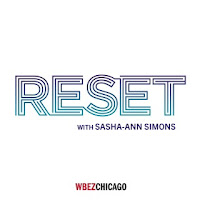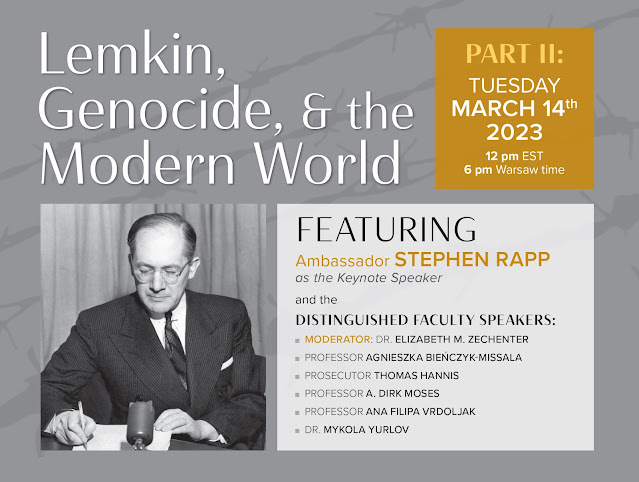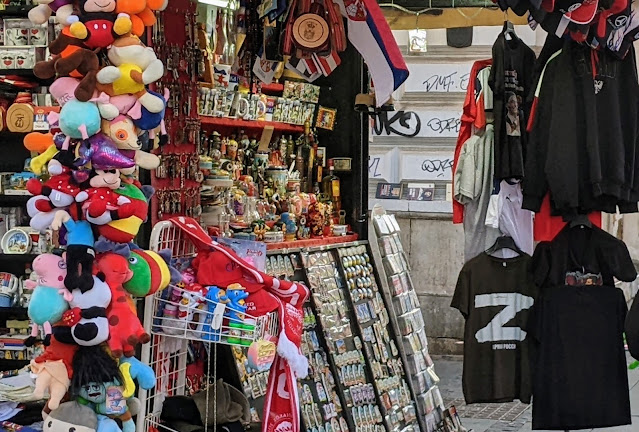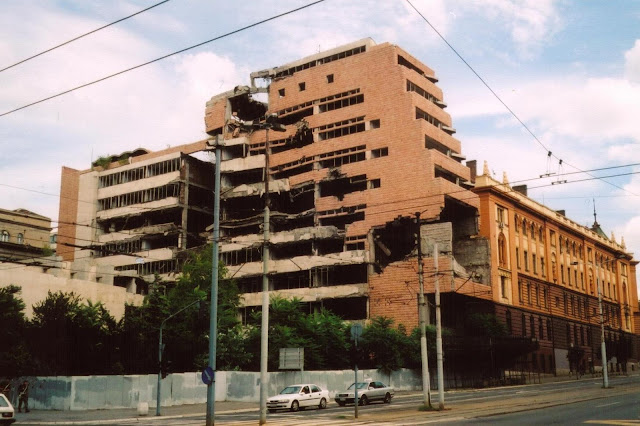 |
In Washington, D.C., the International Law Section of the American Bar Association receives a message from Ukraine. Attorney Michael Burke is at the lectern; Ambassador William B. Taylor is at the table. Photo by RJ Peltz-Steele CC BY-NC-SA 4.0 with no claim to depicted video.
|
The war in Ukraine is not only about Ukraine, and Ukraine will prevail if the West expands military support.
Those were the top takeaways from experts at a panel of the American Bar Association International Law Section (ABA ILS) in Washington, D.C., today, April 28.
The panel at the Capital Hilton comprised William B. Taylor, U.S. ambassador to Ukraine from 2006 to 2009 and now vice president for Russia and Europe at the NGO U.S. Institute of Peace; Vladyslav Rashkovan, a board member of the International Monetary Fund and former governor of the Ukraine Central Bank; attorney Michael E. Burke of Arnall Golden Gregory, moderator; and, by pre-recorded message, an attorney in the Kyiv area. The panelists spoke in their personal capacities, not as representatives of their organizations.
'This war is not new'
I withhold the name of the Kyiv attorney for security; he is a member of the ABA ILS. As a man under age 60, he cannot leave Ukraine and sent his regrets with the message, recorded on Orthodox Easter, April 24.
Clad in a hoodie and standing before a nondescript wooded background, the Kyiv attorney described persistent air-raid sirens, especially at night, with rockets anticipated to strike "civil" targets all over Ukraine. He described the mentality of the resistance with knowledge that Ukrainian civilians have been killed, tortured, and raped by Russian soldiers.
"This war is not new for us," the attorney said. "It has been around for hundreds of years," hostilities boiling over only most recently in 2014 and 2022.
I was reminded of speaking to a Krakovian friend, a lawyer and long-ago student of mine, in March, earlier in the invasion. Like many Poles, he was planning to host Ukrainian refugees in Warsaw, where he lives now.
"It's the Russians again," he said matter-of-factly.
The Kyiv attorney emphasized a recurring theme we hear from Ukrainian officials and commentators, that the war is not only about Ukraine. Rather, "Ukraine is just the first obstacle in the way of Russia," he said. If Russia is not stopped in Ukraine, "European kids and families will keep dying in their homes."
The attorney urged lawyers from around the world to reach out to their political leaders to emphasize the importance of supporting Ukraine, especially militarily.
"Please do your best to support Ukrainians," he concluded. "And keep praying for Ukraine and the brave Ukrainian army."
Ukraine will win, if ...
If western military aid to Ukraine persists and expands, Ambassador Taylor predicted, Ukraine will win the war. Presently, he explained, Russia is "probing" eastern Ukraine for weakness and softening defenses with air and long-range artillery strikes, while "preparing for a big offensive."
Rashkovan echoed the characterization of conflict with Russia as enduring for "centuries." The February 24, 2022, invasion was "a shock, but not a surprise," he said.
Russia has coveted Ukraine since the 20-aughts, Rashkovan said. To Russia's frustration, every attempt to draw Ukraine closer had the effect of pushing it away.
According to Rashkovan, surprises did follow the invasion of Ukraine, but they were for Russian President Vladimir Putin and for the West.
Putin "believ[ed] his own propaganda," Rashkovan said, citing a recent piece in The Economist by Ian Bremmer. Putin thought "Ukrainians would be waiting with flowers."
Another surprise to Putin was that Ukrainian resistance proved to be sustainable, Rashkovan said. In contrast, the Russian army proved "not so modern," "not prepared for 21st-century war," "not ready to fight in the streets, against drones and [civic] groups. They are fighting [with] a strategy of the [19]80s."
Putin also miscalculated by giving a speech in February declaring interest only in the Ukrainian coast, immediately before Russia bombed targets nationwide, Rashkovan said. The duplicity created "outrageous anger" and "unity" in Ukrainians and in the world, rather than the fear that Putin intended.
Surprises resulted for the West, as well, Rashkovan said. The West "finally understood" that conflict in eastern Ukraine, simmering since the 2014 invasion of Crimea, was about more than the Donbas region and more than just Ukraine.
"I don't want to say for Europe," because Europeans remained reluctant to give up business with Russia, Rashkovan said. But now it has become clear that Putin stands against the western liberalism of the last half century and norms that it has generated: "globalization, humanism, ... multiculturalism, tolerance, and democracy."
"Ukraine is now on the front line of this fight," Rashkovan said. "Let's be frank. Until recently, the West was not ready to fight for Ukraine. And Putin showed that he is ready to fight."
The defense of Ukraine should be instructive to the
West, Taylor and Rashkovan both said, resulting in the joke, "Now NATO
might join Ukraine."
But the joke is "not crazy," Taylor said. Ukrainians "are showing how to fight, how to win this war." Upon a Ukrainian victory, he opined, the West
should guarantee Ukrainian security against future invasion, whether
through NATO or another agreement binding in international law.
Stop saying 'off ramp'
I was pleased to hear a harder line from Ambassador Taylor than I hear from the U.S. leaders that Taylor no longer represents. Evidently, I am not the only person tired of hearing commentators chatter about the need for an "off ramp" for Putin, a compromise, or my word, "appeasement."
"I am not interested in an off ramp," Taylor said. "Putin caused this problem" by invading a peaceful neighbor that posed no threat and made no provocation.
An "off ramp suggests that we should find something to help him save face," Taylor explained. "No, no. He needs to find a way out." When Putin realizes he is losing the so-called "second phase" of the war, if Western military aid does expand, Putin "will look for an off ramp, something to convince the Russian people that it was worth all this. Good luck with that."
Taylor said he is not worried about Russian aggression against other countries, such as Moldova, as long as Ukraine prevails. Without control of the Ukrainian coast, Taylor opined, Putin "doesn't have the manpower ... to go all the way across the south."
And Russia will not use the nuclear option, Taylor said. "I don't think Putin is suicidal," nor "crazy." "[W]e have to be ready," he said, but "Washington sees no indication of an operational step toward that."
However, if western military aid is not expanded, and Russia does gain control of Ukraine, "then that would be a threat," Taylor said. Besides Moldova, Russian aggression would threaten Georgia, the Balkans, and, ultimately, NATO allies.
"This is not the last war in Europe" if Russia prevails, Rashkovan agreed. "Who knows about Sweden and Finland," countries that recently signaled their intentions to join NATO, "now under critic[ism] from Russia. Who knows about Poland."
Zelensky stars
Both Taylor and Rashkovan praised the leadership of President Volodymyr Zelensky as key in the defense of Ukraine.
Taylor was in Kyiv just three weeks before the invasion, he said, and he met with political opposition leaders, who were characteristically critical of Zelensky. Upon the invasion of February 24, "that changed.... Zelensky has motivated and inspired leaders, parliaments, nations around the world." Now, in the context of the war, opposition leaders line up "nearly 100%" in support of the president, Taylor said.
Famously an actor and comedian before entering politics, Zelensky was a sort of Stephen Colbert of Ukrainian "late night" fame. (Colbert has "run" for the U.S. Presidency more than once, since 2008, in mixed satirical and activist capacities.) A pledge to eradicate corruption saw Zelensky to a stunning 73% electoral victory in 2019. When war broke out, Taylor said, it was Zelensky himself who gathered and energized the Ukrainian leadership.
"He understands the Ukrainian people because of his entertainment background," Taylor said. His audience is the electorate. "It's that connection with the leader and the people that gives him the strength, the moral strength."
China watches and learns
Taylor commented also on the perspective of China. Just before the invasion, at the Olympics, Beijing broadcast its allyship with Moscow. China has been conspicuously non-committal since. It has not joined western efforts to arm Ukraine, but has refrained from speaking favorably of the invasion and has not moved to undermine western sanctions. In fact, Taylor said, many Chinese firms are respecting the sanctions.
China's strategy is pragmatic. Before the invasion, China was the biggest foreign investor in Ukraine, Taylor explained. And Chinese economic planners have their eyes on the European market, "which dwarfs the size of the economy in Russia."
Moreover, the Chinese are studying Russia's exploits relative to the matter of Taiwan. "President Xi is watching very carefully the response of the United States and NATO, putting sanctions on a central bank," Taylor said. "That probably opened some eyes in China: 'Can they do it to us?'"
And China is watching the military engagement on the ground, too, Taylor said. China might be wondering whether, like Russia, its army is not as strong as Beijing has calculated, and whether Taiwanese resistance to a takeover might be stronger than anticipated.
Lawyers and sanctions help
Both Taylor and Rashkovan told the ABA ILS audience that lawyers are important in the Ukraine conflict, now and in the future. Lawyers play a role now in documenting and calculating infrastructure losses in Ukraine, Rashkovan said. Data are being fed to the World Bank in anticipation of a reparations bill that might someday issue to Russia.
Meanwhile, Rashkovan said, lawyers should be helping Ukrainian people and businesses to design "legal class action[s]" against Russian defendants. "I don't know the practicalities," he said, "but we should deliberate this further."
Taylor said that American lawyers can support the investigation of war crimes notwithstanding U.S. non-ratification of the Rome Statute that created the International Criminal Court. Lawyers can help, too, to strengthen sanctions, which must be made "more targeted and smarter," Rashkovan said.
To evade sanctions, "Russia will start looking for the back doors," Rashkovan said. Russia still imports western food through eastern European and central Asian allies; Rashkovan joked about "Belarusian parmesan," before Belarus, too, came under sanctions.
According to the Crimean play book, he said, Russians will take over businesses from fast food, such as McDonald's, to car manufacture and aerospace, "knowing the techniques" to keep them running. But Rashkovan predicted that "the capacity of Russia to produce something serious, high tech, will diminish substantially."
Acknowledging that not everyone sees sanctions against Russia as necessarily enduring as long as Putin's presidency, Taylor suggested that sanctions will outlast the war, "[b]ecause when they [Russia] lose, they will be back.
"They will not give up," Taylor said, at least not as long as Putin remains on his "almost mystical mission, his commitment to dominate Ukraine."








.jpg)









.png)











